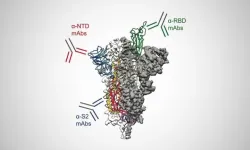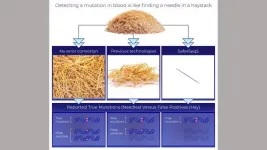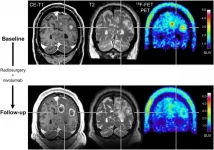(Press-News.org) The most complete picture yet is coming into focus of how antibodies produced in people who effectively fight off SARS-CoV-2 work to neutralize the part of the virus responsible for causing infection. In the journal Science, researchers at The University of Texas at Austin describe the finding, which represents good news for designing the next generation of vaccines to protect against variants of the virus or future emerging coronaviruses.
Previous research focused on one group of antibodies that target the most obvious part of the coronavirus's spike protein, called the receptor-binding domain (RBD). Because the RBD is the part of the spike that attaches directly to human cells and enables the virus to infect them, it was rightly assumed to be a primary target of the immune system. But, testing blood plasma samples from four people who recovered from SARS-CoV-2 infections, the researchers found that most of the antibodies circulating in the blood -- on average, about 84% -- target areas of the viral spike protein outside the RBD -- and, apparently, for good reason.
"We found these antibodies are painting the entire spike, both the arc and the stalk of the spike protein, which looks a bit like an umbrella," said co-corresponding author Greg Ippolito, who is a research associate professor in UT Austin's Department of Molecular Biosciences and an assistant professor of oncology at the university's Dell Medical School. "The immune system sees the entire spike and tries to neutralize it."
Many of these non-RBD-directed antibodies the team identified act as a potent weapon against the virus by targeting a region in a part of the spike protein located in what would be the umbrella's canopy called the N-terminal domain (NTD). These antibodies neutralize the virus in cell cultures and were shown to prevent a lethal mouse-adapted version of the virus from infecting mice.
The NTD is also a part of the viral spike protein that mutates frequently, especially in several variants of concern. This suggests that one reason these variants are so effective at evading our immune systems is that they can mutate around one of the most common and potent types of antibody in our arsenals.
"There's an evolutionary arms race going on between the virus and our immune systems," said Jason Lavinder, research associate in the McKetta Department of Chemical Engineering and co-corresponding author of the new study. "We're all developing a standard immune response to this virus that includes targeting this one spot and that's exerting selective pressure on the virus. But then the virus is also exerting its evolutionary strength by trying to change around our selective immune pressures."
Despite these maneuvers by SARS-CoV-2, the researchers said about 40% of the circulating antibodies target the stalk of the spike protein, called the S2 subunit, which is also a part that the virus does not seem able to change easily.
"That's reassuring," Ippolito said. "That's an advantage our immune system has. It also means our current vaccines are eliciting antibodies targeting that S2 subunit, which are likely providing another layer of protection against the virus."
That's also good news for designing vaccine boosters or next-generation vaccines against variants of concern, and even for developing a vaccine that can protect against future pandemics from other strains of the coronavirus.
"It means we have a strong rationale for developing next-generation SARS-CoV-2 vaccines or even a pan-coronavirus vaccine that targets every strain," Ippolito said.
UT Austin researchers are among several in the world now aiming to develop a single coronavirus vaccine to fight infection from all coronaviruses, not just SARS-CoV-2.
INFORMATION:
The first author of the study is William Voss, a graduate student at UT Austin. In addition to Lavinder and Ippolito, senior authors from UT Austin are Jimmy Gollihar, Ilya Finkelstein, Brent Iverson, Jason McLellan and George Georgiou. Georgiou and Ippolito are also affiliated with UT Austin's Dell Medical School. Gollihar is also affiliated with the Army Research Laboratory South.
Collaborating institutions are the University of North Carolina at Chapel Hill, the U.S. Army Medical Research Institute of Infectious Diseases and the Centers for Disease Control and Prevention.
This research was funded in part by the National Institutes of Health, the Clayton Foundation and the Welch Foundation.
New York, NY (May 4, 2021) - A powerful, long-term study from WCS adds scientific backing for global calls for conserving 30 percent of the world's ocean. The studied no-take marine protected areas (MPAs) increased the growth of fish populations by 42 percent when fishing was unsustainable in surrounding areas, achieving the benefits of stable and high production of fish populations for fishers, while protecting threatened ecosystems.
The study recorded fish catches for 24-years across a dozen fish landing sites within two counties in Kenya, which allowed scientists to evaluate the long-term impacts of two different fisheries management methods. While one county ...
Harsh prison sentences for juvenile crimes do not reduce the probability of conviction for violent crimes as an adult, and actually increase the propensity for conviction of drug-related crimes, finds a new study by economists at UC Riverside and the University of Louisiana. Harsh juvenile sentences do reduce the likelihood of conviction for property crimes as an adult. But the increase in drug-related crimes cancels out any benefit harsh sentences might offer, researchers found.
"Juvenile incarceration is a double-edged sword which deters future property crimes but makes drug convictions more likely in adulthood. Thus, it's hard to make firm policy recommendations ...
Scientists believe a stomach-specific protein plays a major role in the progression of obesity, according to new research in Scientific Reports. The study co-authored by an Indiana University School of Medicine researcher, could help with development of therapeutics that would help individuals struggling with achieving and maintaining weight loss.
Researchers focused on Gastrokine-1 (GKN1) -- a protein produced exclusively and abundantly in the stomach. Previous research has suggested GKN1 is resistant to digestion, allowing it to pass into the intestine and interact with microbes in the gut.
In the Scientific Reports study, researchers show that inhibiting GKN1 produced significant differences in weight and levels of body fat in comparison to when the protein was expressed.
"While ...
Next-generation gene sequencing (NGS) technologies --in which millions of DNA molecules are simultaneously but individually analyzed-- theoretically provides researchers and clinicians the ability to noninvasively identify mutations in the blood stream. Identifying such mutations enables earlier diagnosis of cancer and can inform treatment decisions. Johns Hopkins Kimmel Cancer Center researchers developed a new technology to overcome the inefficiencies and high error rates common among next-generation sequencing techniques that have previously limited their clinical application.
To correct for these sequencing errors, the research team from the Ludwig Center and Lustgarten Laboratory at the Johns Hopkins ...
ROCHESTER, Minn. -- A pair of Mayo Clinic studies shed light on something that is typically difficult to see with the eye: respiratory aerosols. Such aerosol particles of varying sizes are a common component of breath, and they are a typical mode of transmission for respiratory viruses like COVID-19 to spread to other people and surfaces.
Researchers who conduct exercise stress tests for heart patients at Mayo Clinic found that exercising at increasing levels of exertion increased the aerosol concentration in the surrounding room. Then also found that a high-efficiency particulate air (HEPA) device effectively filtered out the aerosols and decreased the time needed to ...
Reston, VA--For patients with brain metastases, amino acid positron emission tomography (PET) can provide valuable information about the effectiveness of state-of-the-art treatments. When treatment monitoring with contrast-enhanced magnetic resonance imaging (MRI) is unclear, adding 18F-FET PET can help to accurately diagnose recurring brain metastases and reliably assess patient response. This research was published in The Journal of Nuclear Medicine.
Newer treatment options for patients with brain metastases--such as immune checkpoint inhibitors and targeted therapies--are effective, but can cause a variety of side effects. ...
The human immune system doesn't just protect our health, it reflects it. Each encounter with a potential disease-causing agent causes the body to produce specific immune agents -- proteins known as antibodies and T-cell receptors -- tailor-made to recognize and destroy the invader. Tasked with preventing re-infection, antibodies and T-cell receptors (TCR) from your previous encounters circulate throughout the body indefinitely, like a record of your personal medical history that you carry inside of you.
Clinical pathologist Ramy Arnaout, MD, DPhil, ...
WASHINGTON, DC -- A new case report, detailed in Annals of Emergency Medicine, is the first known case of a patient with VITT (vaccine-induced thrombotic thrombocytopenia) treated with a heparin alternative following the Centers for Disease Control and Prevention (CDC) guidance.
An otherwise healthy female patient in her 40s came to the emergency department at UCHealth University of Colorado Hospital twelve days after receiving the Johnson & Johnson vaccine with a headache, dizziness, and vision changes. The patient was treated on April 13, 2021, the same day that the Centers for Disease Control and Prevention (CDC) announced a pause in the administration of the Johnson & Johnson vaccine. CDC guidance recommended ...
You know that raw overwhelm people have been reporting after months of a pandemic, compounded by economic issues and social unrest? Does fatigue and compulsive social media scrolling strike a familiar chord?
Those brittle feelings offer us a glimpse into what regular life can be like for individuals with sensory processing sensitivity (SPS), a biological trait possessed by roughly a third of the population. In a world of constant information overload and stress, it's a characteristic that can result in a variety of behaviors, from emotional outbursts to withdrawal, overwhelm and procrastination.
"Behaviorally, we observe it as being more careful and cautious when approaching new things," said Bianca Acevedo, a researcher ...
Boulder, Colo., USA: The Geological Society of America regularly publishes
articles online ahead of print. For April, GSA Bulletin topics
include multiple articles about the dynamics of China and Tibet; the Bell
River hypothesis that proposes that an ancestral, transcontinental river
occupied much of northern North America during the Cenozoic Era; new
findings in the climatic history during one of the Earth's coldest periods:
The Late Paleozoic Ice Age; and the age an nature of the Chicxulub impact
crater. You can find these articles at END ...



